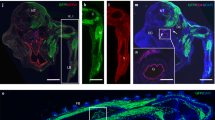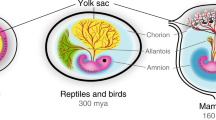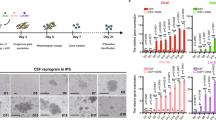Abstract
THE development of lymphoid organs in the chick embryo is dependent on colonisation by extrinsic stem cells1–6, some of which are present in the yolk sac blood islands, as Moore and Owen demonstrated by transplanting 7-d yolk sac cells into 14-d-old irradiated chicken embryos2. These authors demonstrated population of lymphoid organs by donor-derived cells, and suggested that all haemopoietic stem cells are formed in the early yolk sac3. This interpretation has been challenged7–11, particularly on the basis of results obtained in quail–chick chimaeric germs7. We present here further evidence, based on the use of chick–chick yolk sac–embryo chimaeras, that lymphoid stem cells in the chicken do not originate primarily in the yolk sac.
This is a preview of subscription content, access via your institution
Access options
Subscribe to this journal
Receive 51 print issues and online access
$199.00 per year
only $3.90 per issue
Buy this article
- Purchase on Springer Link
- Instant access to full article PDF
Prices may be subject to local taxes which are calculated during checkout
Similar content being viewed by others
References
Moore, M. A. S. & Owen, J. J. T. Nature 208, 956, 989–990 (1965).
Moore, M. A. S. & Owen, J. J. T. Nature 215, 1081–1082 (1967).
Moore, M. A. S. & Owen, J. J. T. Lancet ii, 658–659 (1967).
Moore, M. A. S. & Owen, J. J. T. J. exp. Med. 126, 715–725 (1967).
Le Douarin, N. M. & Jotereau, F. V. Nature 246, 25–27 (1973); J. exp. Med. 142, 17–40 (1975).
Le Douarin, N. M., Houssaint, E., Jotereau, F. V. & Belo, M. Proc. natn. Acad. Sci. U.S.A. 72, 2701–2705 (1975).
Dieterlen-Lièvre, F. J. Embryol. exp. Morph. 33, 607–619 (1975).
Eskola, J. thesis, Univ. Turku (1976).
Toivanen, A., Eskola, J. & Toivanen, P. Annls Immun. Inst. Pasteur, Paris 127 C, 923–929 (1976).
Eskola, J. Immunology 32, 467–474 (1977).
Eskola, J. & Toivanen, P. in Avian Immunology (ed. Benedict, A. A.) 39–45 (Plenum, New York, 1977).
Martin, C. Cr. Soc. Biol. Séanc. 166, 283–285 (1972).
Le Douarin, N. M. Bull. biol. Fr. Belg. 103, 435–452 (1969).
Dieterlen-Lièvre, F., Beaupain, D. & Martin, C. Annls Immun. Inst. Pasteur, Paris 127 C, 857–863 (1976).
Owen, J. J. T. Chromosoma 16, 601–608 (1965).
Hamburger, V. & Hamilton, H. L. J. Morph. 88, 49–92 (1951).
Jotereau, F. V. & Houssaint, E. in Developmental Immunobiology (ed. Solomon, J. B.) 123–130 (Elsevier, Amsterdam, 1977).
Murray, P. D. F. Proc. R. Soc. B 3, 497–521 (1932).
Toivanen, P., Toivanen, A. & Good, R. A. J. Immun. 109, 1058–1070 (1972).
Author information
Authors and Affiliations
Rights and permissions
About this article
Cite this article
LASSILA, O., ESKOLA, J., TOIVANEN, P. et al. The origin of lymphoid stem cells studied in chick yolk sac–embryo chimaeras. Nature 272, 353–354 (1978). https://doi.org/10.1038/272353a0
Received:
Accepted:
Published:
Issue Date:
DOI: https://doi.org/10.1038/272353a0
This article is cited by
-
Hematopoiesis and stem cells: plasticity versus developmental heterogeneity
Nature Immunology (2002)
-
Para-aortic splanchnopleura from early mouse embryos contains B1a cell progenitors
Nature (1993)
Comments
By submitting a comment you agree to abide by our Terms and Community Guidelines. If you find something abusive or that does not comply with our terms or guidelines please flag it as inappropriate.



